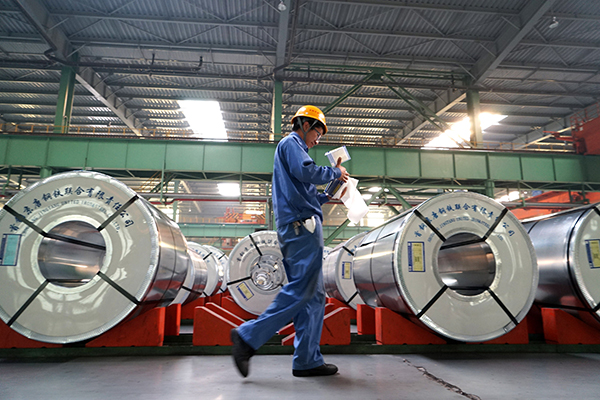 |
|
A worker checks steel product files at a cold rolling mill of Tangsteel Group Ltd in Tangshan, Hebei province. [Photo/China Daily] |
BEIJING - Wearing a red hat and waving a red flag, Jiang Qin now works to assist traffic police, persuading pedestrians and bike riders to obey traffic rules on a street in Hefei, capital of East China's Anhui province.
Along with 5,000 others, Jiang was laid off late last year when Magang (Group) Holding Co shut down its Hefei steel plant, amid a nationwide campaign to reduce overcapacity in the steel industry.
"It used to take me an hour and a half to get to work on crowded bus," said Jiang. "Now I work near my home, earn 1,500 yuan ($225 ) a month. I am happy with my new job, because the job at the plant is no longer ideal as I'm getting old, "she said.
New jobs for old
Zhou Hanhua, 56, from Wuhan, capital of Central China's Hubei province, has a similar story to tell.
Laid off late last year from Wuhan Iron and Steel, Zhou is now a driver with Didi, China's biggest on-demand mobility (ODM) firm.
Besides his earnings from his new job, Wuhan Iron and Steel still pays him around 1,000 yuan a month. "My monthly income is now as much as I earned at the prime time of Wuhan Iron and Steel," he said.
According to Didi, there are now 219,000 ex-steel workers working for the company across China. In Wuhan alone, 7,000 Didi drivers used to work for Wuhan Iron and Steel.
It is alright for some, but many of the laid-off workers are upset and worried about their future. Most are keen to try their luck in a new career.
Young people no longer regard works at a state-owned enterprise as a "job for life" and the salary has halved in real terms, said another Zhou, also a former worker with Wuhan Iron and Steel.
"Nobody knows how long it will take for the sector to pick up again, if ever," he said. "It would be much better to try to find a new career."
Wuhan city government has organized two job fairs this year with 500 employers offering thousands of jobs. Wuhan Iron and Steel plans to cut another 10,000 jobs by December.
Failure is not an option
Despite every possible effort to cut production, China's steel industry set a new monthly record of 69.5 million tons in June."Many small steel mills resumed production as prices rose in March and April," said Magang chairman Gao Haijian.
If small steel firms are not closed completely, it will be difficult to meet capacity reduction targets of 100 to 150 million tons by 2020, with 500,000 workers to be laid off. This year alone, the country plans to eliminate 45 million tons with 180,000 workers laid off, according to Xu Shaoshi, head of the National Development and Reform Commission (NDRC).
But according to the Ministry of Industry and Information Technology, only 13 million tons were cut in the first half of the year, 30 percent of the annual target.
The NDRC, however, has ordered authorities to meet their targets, warning that failure would lead to severe punishment.
"A proportion of China's steel mills do not meet environmental standards and should be shut down," said Ma Guoqiang, chairman of Wuhan Iron and Steel.
Better together
With more mergers and acquisitions, the steel sector would run more efficiently, said Chen Derong, president of Baosteel Group.
Ma of Wuhan Iron and Steel said restructuring is a must in cutting capacity and improving efficiency to create globally competitive firms.
In 2015, more than half of China's steel companies reported total losses of 65 billion yuan. Once a profit engine for China, iron and steel boomed while infrastructure investment fed demand for commodities such as steel and cement. As the economy cools, the production glut has become as burdensome as it was once bountiful.
Apart from capacity cuts, steel firms are struggling up the value chain with higher value-added products. Baosteel sees the auto, nuclear power and defense as possible alternatives for the waning construction industry, said Chen.
Magang plans to invest 7.7 billion yuan upgrading 10 production lines. In 2014, it acquired a French counterpart to help it improve products and penetrate the European market.
Magang also has sent 15 teams to learn from auto and home appliance makers to better understand what the customers need.
"We will clearly understand customers' demands and this will help to improve our competitiveness," said Gao of Magang.
